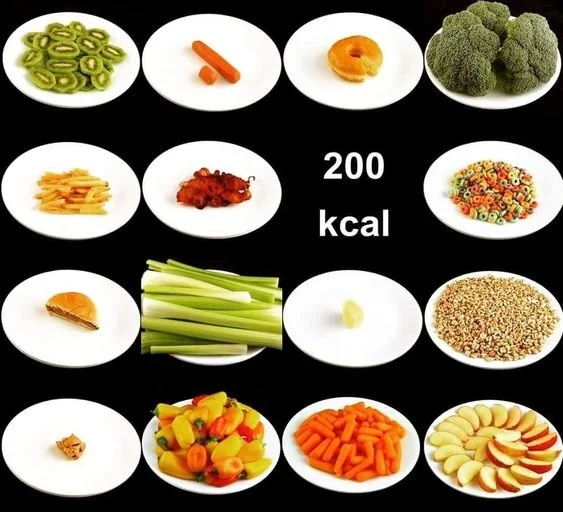It’s the time of year noted to give thanks and celebrate great food. And yes, it’s true. Odds are, we’ll gain weight over the holidays. Most studies suggest that we may gain anywhere from 1-3 pounds to 8 pounds between Thanksgiving and New Year’s Day. Regardless of the amount, it’s not uncommon to feel bloated and overtired during the holiday season. Eating tends to take on a new dimension during the holiday season. In addition to our typical meals, we manage to fit in seasonal treats, party foods, and possibly more alcohol. So, let’s strategize to avoid that unwanted weight gain and/or bloated, puffy, feel.
We know that healthy eating and exercise habits can prevent or minimize this weight gain.
Energy density – why does it matter?
Energy density can help you eat more and lose weight. Yes, you read that correctly. Energy density is the number of calories a food has per unit mass. For example, 100 calories is equal to ¼ cup of raisins OR 1 2/3 cup fresh grapes; more than a sixfold difference. We tend to consume fewer calories in the form of grapes compared with raisins. Low energy density foods have more water or air, so while the volume is greater, their calories are fewer.
Research has shown that the amount (or weight) of food that we report eating on a daily basis is more consistent than our calorie intake. By choosing less-dense foods, you still consume the same amount of food, but have a healthier selection of food with fewer calories. The image below illustrates varying amount of foods though every plate contains 200 calories of food.
Physical activity not only ‘burns’ calories in the moment, it helps you continue to burn calories after the fact. Greater muscle mass increases your metabolism and hence, your ability to burn calories.
Benefits of Strength Training:
Energizes & revitalizes
Increases muscle mass & strength
Halts bone loss & restores bone
Improves balance
Stabilizes & protects joints
Helps control weight
Improves sleep quality
Supports mental well-being
11 Healthful Tips for the Holidays
Start your day with protein. Include 25-35 gm protein with your 1st meal of the day. A high protein breakfast can help stabilize blood sugar and hunger hormones throughout the day.
Eat a healthy high-fiber snack before the celebration instead of ‘saving room’ for party food. A satisfied stomach will help you be more selective in your food choices at the party.
Nibble on vegetables first before sampling higher-caloric treats at a party. Really hungry? Eat more veggies! Don’t think they’ll be served – eat a plate of veggies at home before you head to the party.
Practice portion control strategies. Fill half your plate with vegetables or salads if they’re an option. Choose small portions of high calorie/high fat treats.
Choose wisely with appetizers. Apps, starters, hors d’oeuvres, or however we may call them are particularly well-known to be energy dense – think puff pastries, quiches, cheese & crackers, fried calamari, loaded potato skins, buffalo wings. For a healthful app, opt for crunchy and colorful items from the vegetable platter. A hummus or bean dip will be a less calorically dense option than a cheese or creamy style dip. Shrimp cocktail, chicken satay, or if you’re really celebrating, oysters in the half shell are high protein, low energy dense options. Lentil or bean dishes tend to be on the healthier side as well.
Slow your pace. Eating slowly allows your stomach enough time to send the hormonal signal to our brain that we’re full, helping to prevent overeating. Set your fork down between bites, use chopsticks, take small bites, whatever works for you to slow your pace. When we take small bites of food, we oftentimes consume significantly less food. Eat until you are satisfied, but not stuffed.
Be wise with alcohol. If you consume alcohol, start with a tall glass of water or sparkling water. Have another glass of water prior to having a second alcoholic beverage. If you choose to drink, opt for a glass of wine or liquor with club soda. Avoid drinks with fruit juices, soda, tonic, or other mixers with added sugars. Alcohol not only adds calories, but may also disturb your sleep.
Indulge mindfully. If you desire, carefully choose what you wish to eat as a treat. Be mindful of the portion, and enjoy. Acknowledge all the dietary goals you achieved (yes, eat those veggies, protein, etc. first) that day and don’t spend time feeling guilty.
Visit the people, not the food. Focus your attention on socializing. Stand away from the buffet or food table to prevent mindless eating.
Make physical activity a priority during the holiday season. Socialize with friends during a walk before or after dinner. Walking a mere 3-5 minutes after a meal can help blunt the rise in your blood sugar following a meal.
Get enough sleep. You will feel less stressed, better rested, and be able to make better choices if well rested. Lack of sleep or nonrestorative sleep may increase hormones that lead to weight gain.
Set realistic goals. Monitor your portions. Enjoy nutritious foods. Be physically active. Get your rest.
Wishing you all a Happy Thanksgiving! Please know that I'm grateful to work with each and every one of you. I hope you can enjoy this holiday with family and/or friends.
In Health,
Natalie

